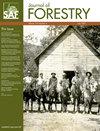生物多样性保护的生态恢复引发了树皮甲虫害虫及其天敌的响应
IF 3.2
2区 农林科学
Q1 FORESTRY
引用次数: 2
摘要
恢复森林结构和功能越来越多地用于北方森林,以阻止生物多样性的丧失。生态恢复通常旨在增加死亡和垂死树木的数量,以增强依赖枯木的生物的生物多样性,但它也可能增加有害树皮甲虫物种的种群规模,甚至在恢复后几年。本文在瑞典北部进行了大规模的恢复实验,评估了恢复性林窗砍伐和规定焚烧对树皮甲虫(Ips typographus、Polygraphus poligraphus、Tomicus piniperda和Pityogenes chalcographus)种群以及树皮甲虫最重要的捕食者Thanasimus spp的影响。在林分尺度和景观尺度上评价了林分特征对版式刺桐丰度的影响。在恢复后5年,砍断林分中poligraphus的丰度最高,被树皮甲虫新攻的云杉数量也最高。而规定焚烧对害虫树皮甲虫的丰度维持最低,尤其是版印瓢虫和poligraphus,其天敌Thanasimus spp的丰度维持最高,版印瓢虫种群丰度也受到林分半径500 m范围内的砍伐面积的积极影响。结果表明,从长期来看,规定焚烧是一种较安全的生态修复方法。根据我们的研究结果,在云杉为主的成熟林分上,在开始生态恢复处理5年后,当地树皮甲虫爆发的风险仍然存在。本文章由计算机程序翻译,如有差异,请以英文原文为准。
Ecological restoration for biodiversity conservation triggers response of bark beetle pests and their natural predators
The restoration of forest structure and function is increasingly being used in boreal forests in order to halt the loss of biodiversity. Often ecological restoration is aimed at increasing the volume of dead and dying trees to enhance the biodiversity of deadwood-dependent organisms, but it may also increase population sizes of pest bark beetle species, even several years following restoration. Herein, we used a large-scale restoration experiment in Northern Sweden to assess the 5 years post-restoration effects of restorative gap cutting and prescribed burning on the populations of a set of economically harmful pest bark beetles (Ips typographus, Polygraphus poligraphus, Tomicus piniperda and Pityogenes chalcographus) and the most important predators of bark beetles, Thanasimus spp. In addition, we assessed the effects of forest stand characteristics at stand and landscape scale on the abundance of I. typographus. Five years post-restoration, gap-cut stands supported the highest abundances of P. poligraphus and contained the highest count of spruce trees newly attacked by bark beetles. By contrast, prescribed burning generally sustained the lowest abundances of pest bark beetles, especially I. typographus and P. poligraphus, and the highest abundance of their natural predators Thanasimus spp. The population abundance of I. typographus was also positively affected by the area of clear cuts within a 500 m radius from the stand. In conclusion, prescribed burning appears to be a safer method for ecological restoration than gap cutting in the long-term. According to our results, a risk of a local bark beetle outbreak still remains 5 years following the initiation of ecological restoration treatments on spruce-dominated mature gap-cut stands.
求助全文
通过发布文献求助,成功后即可免费获取论文全文。
去求助
来源期刊

Forestry
农林科学-林学
CiteScore
6.70
自引率
7.10%
发文量
47
审稿时长
12-24 weeks
期刊介绍:
The journal is inclusive of all subjects, geographical zones and study locations, including trees in urban environments, plantations and natural forests. We welcome papers that consider economic, environmental and social factors and, in particular, studies that take an integrated approach to sustainable management. In considering suitability for publication, attention is given to the originality of contributions and their likely impact on policy and practice, as well as their contribution to the development of knowledge.
Special Issues - each year one edition of Forestry will be a Special Issue and will focus on one subject in detail; this will usually be by publication of the proceedings of an international meeting.
 求助内容:
求助内容: 应助结果提醒方式:
应助结果提醒方式:


